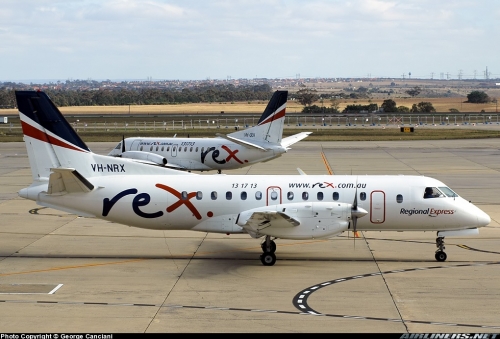Australia's Rex warns of disruptions, accuses rivals of plundering pilots
14 July, 2018
3 min read
By joining our newsletter, you agree to our Privacy Policy


Australia’s biggest independent regional airline, Regional Express (Rex), has accused bigger rivals Qantas and Virgin Blue of “rapacious plundering” of its pilot pool as it struggles to cope with increased global demand for aircrew.
Australia has been affected by a global shortage of pilots at a time robust growth in worldwide air travel has put pressure on training organizations to keep up.
Qantas regional offshoot QantasLink and smaller operators such as AirNorth and Australia’s iconic Royal Flying Doctor Service have all been hit by increased competition for pilots.
The shortage also prompted Qantas Domestic to recently announce a temporary return of Boeing 747s to transcontinental services.
In an open letter to regional communities, Rex chief operating officer Neville Howell said the airline no longer had enough pilots to roster its usual contingent of stand-by pilots.
He warned that any last-minute sick leave may result in flights being canceled or combined and promised the airline would redouble its efforts in pursuing all pilot recruitment options, including overseas flight crew.
“We will also be reviewing our network with a view to trimming our schedule where possible to conserve resources,’’ Howell said.
Pilot shortages are not new to Australia and regional operators are usually the first affected as pilots move on to bigger airlines to boost their pay packets and further their careers.
Rex responded to a round of strong pilot demand a decade ago by starting its own pilot academy, the Australian Airline Pilot Academy, in which it has invested $A35 million.
Howell said the academy had since trained 220 cadets who make up 71 percent of the airline’s first officers and 29 percent of its captains.
“Whilst Rex’s initiative is successful in responding to natural attrition rates, it is not enough to stave off Qantas and Virgin Australia’s rapacious plundering of Rex’s pilot pool instead of using their not inconsiderable resources to train their own pilots,’’ he said.
“In the past two years, these two airlines collectively have poached 17 percent and 56 percent of Rex’s first officer and captain establishment respectively.
“These two airlines are causing widespread chaos and disruptions to regional air travel by their selfish and irresponsible actions.”
Howell said Rex was acutely aware of the effect flight disruptions had on business and leisure travel plans.
“Rex apologizes for all past and potential future disruption to services throughout the network as a result of the industry-wide global pilot shortage,’’ he said.
Both major airline groups are already involved in pilot training and there is the prospect of further relief in 2019 when Qantas starts up its own training academy with a capacity of up to 500 pilots year.
READ: Qantas names shortlist for pilot academy.
The Flying Kangaroo has selected nine Australian towns as potential sites for the academy from more than 60 applications and plans to make a decision in the third quarter of this year.
The academy’s primary function is to provide a long-term source of flight crew for Qantas but the airline group has also flagged the potential for training overseas pilots.
Forecasts suggest the global airline industry needs about 640,000 more pilots over the next 20 years – 40 percent of them in the Asia-Pacific region.
A summit of Australian general aviation groups also this week called for changes to the Civil Aviation Act to reduce red tape and help promote areas such as pilot training.
Get the latest news and updates straight to your inbox
No spam, no hassle, no fuss, just airline news direct to you.
By joining our newsletter, you agree to our Privacy Policy
Find us on social media
Comments
No comments yet, be the first to write one.

